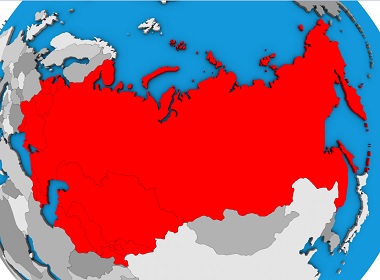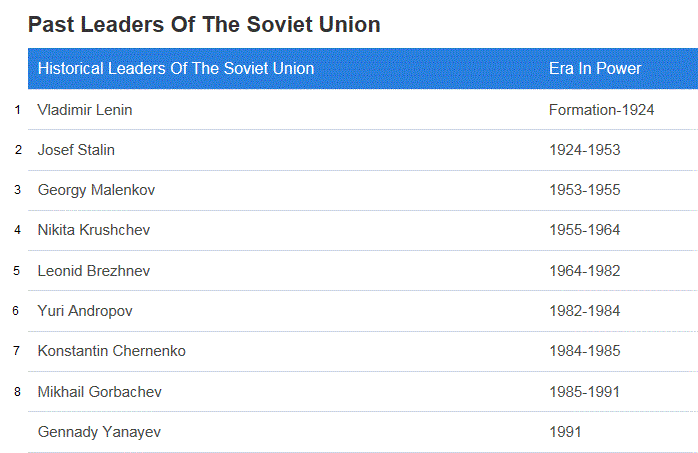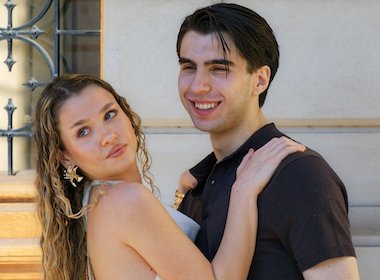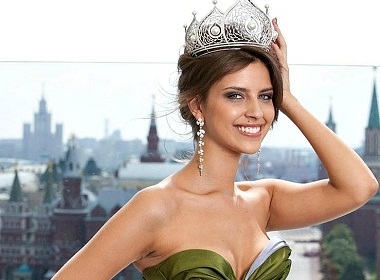

One of the most controversial countries in the modern history and the first communist state covered nearly one-sixth of the world’s land territory, stretching 6,800 miles (10,900 km) from East to West. The intercontinental Union included 15 republics (now all of them are independent countries) in the eastern part of Europe and Northern part of Asia. It was the only country ever that stretched over 11 time zones.
Leaders of the USSR
In 69 years of its existence (1922-1991) the Soviet Union had only 8 official leaders, if we don’t take in consideration the 3-day coup in August 1991, which gave the push to the collapse of the first communist country in the world. The coup saw the Vice-President of the country Gennady Yanayev announcing himself the leader on TV. His 3-day reign was doomed from the start, but the coup shook the already cracking under pressure Union of 15 Socialist Republics, which collapsed in December of the same year.
The end of the former giant (USSR had a larger population than that of the United States of the same period, as well as double the territory of the U.S.) was sudden and unexpected.
In a peaceful manner, the first elected president of Russia Boris Yeltsin along with leaders of Ukraine and Belarus met in Belarusian Belavezha and signed a document, denouncing the Soviet Union and forming a new Commonwealth of Independent States, on 8 December 1991.
Kremlin didn’t object.
On 21 December, 11 of the remaining 12 Soviet Union republics signed a protocol in Alma-Ata, Kazakhstan, confirming dissolution of the USSR and formation of CIS.
President of the Soviet Union Mikhail Gorbashev peacefully resigned, announcing his departure in a televised speech on 25 December. That same day the red sickle and hammer flag of the USSR was lowered over Kremlin, replaced by the Russian tricolor.
So, the Christmas Day in Western countries (Russian Christmas is on 7 January) became the last day of the communist empire, which is not celebrated in Russia or Ukraine in any way, but rather thought of with nostalgia. Today memories of the life in the Union of the Socialist Republics have distinct rosy tones, as times of milk and honey with no worries, compared to pressures and challenges of the modern days.
The move for independence
Baltic republics (Latvia, Estonia, and Lithuania) were the ones in the forefront of the movement for independence. They didn’t even participate in a referendum to keep the USSR in March 1991, which came with 76% of votes in support of retaining the Union of the Socialist Republics. Armenia, Georgia, and Moldova also refrained from participating in the referendum.
Other 9 republics supported the retention of the Soviet Union.
Boris Yeltsin announced Russia independent on 12 June 1991, right after being elected as the first President of Russia. But there was no move made until December of the same year to denounce the Union.
The USSR collapsed over 27 years ago. Yet the memories of the former grandeur are still strong in today’s capital of Russia — Moscow, which was also the centre of the fallen giant. Other countries have no claims over the achievements of the past, while Russia habitually claims the victories as its own, reflected strongly in 10 things that Russians are most proud of.
Can Russia ever become independent of its Soviet past? Ask Russian women you are talking to on Elenasmodels.com what do they think about it!
Share this article














Born in China and having lived both in the US and Canada for years, I gotta say capitalism is much better than communism but capitalism is also not perfect. There’s no utopia on planet earth. You have to fight for it, for a better future and a better way of life. It’s an ongoing process.
You may also find it very interesting who paid for the Bolshevik revolution in 1917 and what they stood to gain from it. Wall Street oligarchs Jacob Schiff, JP Morgan, JD Rockefeller & William Boyce Thompson we’re directly involved in financing the propaganda and red Russian army in the overthrow of Czar Nicholas and eventual execution of the royal family. The goal at the time of the Wall Street oligarchs was to exploit the resources and markets of Russia. The Russian lands hold the bulk of the world’s mineral wealth and significant oil/gas reserves and timber. These Wall Street oligarchs… Read more »
John Z, an interesting excurse to the history of 1917 revolution, which obviously didn’t get the Rockefellers of the world what they wanted, with the Bolsheviks having their own agenda and simply taking the money from anyone who was naïve enough to provide it. The USA bankers, if they indeed put their money into 1917 Communist revolution, didn’t collect much dividends. The USSR as the union of socialist republics was launched in 1922, 5 years after the Bolshevik’s Revolution of 1917, and managed to survive for 69 years. I don’t believe foreign forces and bankers were behind the Perestroika and… Read more »
What “was sudden and unexpected” in that collapse? Did they teach this at nowdays in Russia? Even visitors of the Moscow Olympics notice this is on the way, as my grandparents did. Also Russians; well mostly young, educated ones, or supporters of Gorbashev (some even in top levels) was aware of it, and try to save the USSR with insufficent reforms. Vladimir Putin also said in various interwievs: there were many people who was aware there are a neccesity of reforms and changes, but virtually nobody know what exactly need to do. So they do things, just to do something,… Read more »
Robert, I lived through the collapse of the USSR. It was sudden and unexpected.
As was the Perestroika – which was initiated by Gorbachev in 1987. 4 years before the dissolution of the USSR.
Have some respect, mate. No need to tell people who lived through the times, “how it was”. You look like a dickhead.
For you then it was sudden and unexpexted as for many.
But if you read memoirs and interviews from Russian people, who also lived there/ was there then you see different experiences and point of view.
What I write based on that; NOT on my experiences (I have none, was no there).
Robert, reading memoirs of the top of the Communist party gives you no reason to think you “know it all”. First, they are lying anyway, not telling the whole truth. Second, what the leaders of the country think or consider is largely hidden from 99.99% of people.
Read accounts of real people, talk to regular Russian and Soviet people who lived through these times, there are plenty of them. Read Russian literature of the period, not just what the former ‘elite’ consider necessary to reveal to the public.
Ok. True.
I did not said regular citizens was aware.
But many (leaders, oligarchs, scientists) claim /afterwards/ they were.
And probably you right about lying too in a part of cases. Easy to claim in memoirs they were, even if not.
Jet even in this way they are more reliable for me than when US politicians claim afterwards they make collapse the USSR by the armaments race and by other measures…
Robert, was the break up of Russia and Ukraine a surprise? Was GFS a surprise? Will the collapse of Russia become a surprise? No one knows what is going to happen. They may say “this should happen”, but no one knows.
It’s like magazines that predict celebrity divorces for years, sooner or later some of these predictions come true
One of the Chinese stratagems says: if the country has poor resources, but strong leader, this country can win the war. If the country has a lot of resources, but weak leader, sooner or later country will be destroyed by external enemy. This is what happened with USSR. In 90s there were no sanctions, but inability of the government to keep everything together led to separatist movements. And also USSR needed reforms, Andropov knew it and was preparing them, but he died. The whole structure was old and obsolete: central administration, economy. It was unexpected for majority of people. I… Read more »
In my view, the USSR’s collapse had some negative and positive results. Negative results are that many people in former Soviet republics turned out to be isolated in them. Positive results are that former Soviet republics got the possibility to build their own countries with their own Presidents. And of course, Soviet Union has its own advantages and lacks.